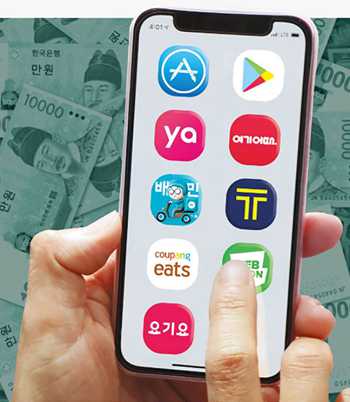The Hidden Cost of Apps
07 August, 2021

Almost everything can now be done by a smartphone app, but the added convenience comes at a price both for businesses and consumers.
No middleman, real or virtual, offers his services for free, and the commissions can be steep. This in turn forces restaurants and other stores, hotels and cab drivers to hike their prices. The problem is that the growing influence of apps has made consumers reliant on them, and businesses with deep pockets like Kakao often gobble up the competition to get a stranglehold on the market.
More than 60 percent of hotel reservations are now made by app, and Kakao T accounts for 80 percent of taxi bookings. The coronavirus epidemic has resulted in a surge in food deliveries via apps, forcing consumers to put up with higher prices of goods and services.
At one dessert restaurant in Songpa, a cup of iced coffee costs W4,500 in the store but W5,000 if on the app (US$1=W1,143). Cakes are also W1,000 more expensive. The difference covers the commission charged by apps and delivery drivers. Some restaurants register under a different name to cater to home-delivery customers and avoid being called out over the price difference.
One 56-year-old office worker said, "Until a few years ago, it was common to give discounts on take-out food because it was more expensive to have a customer in the restaurant. But now it's more expensive to order food. In the end, the app operators laugh all the way to the bank." And a 38-year-old office worker said, "Even though it costs more, it's more convenient and safer to have food delivered home during the epidemic."
Store owners cannot afford to ignore the apps. Of the W40 million in sales one motel in Seoul achieved last month, W15 million came through Yanolja and W9 million from Good Choice. "Out of the W15 million in sales through Yanolja, more than W5 million covers commission, credit card fees, coupon discounts and advertising costs," the owner said. "I also have to deduct wages and other fixed costs."
The companies that run the apps insist that consumers have to put up with increased prices due to the added convenience. But the growing influence of platform operators and lack of alternatives for consumers is troubling.
Platform operators are fighting each other tooth and nail to gain a bigger slice of the burgeoning market. But once a victor emerges from the bloody battle, consumers and business owners have no choice but to surrender to them.
In other countries, steps have been taken to curtail the rising influence of greedy platform operators, but in Korea there have been no studies on the effect they have on consumer prices.
Jung Woo-sung at Pohang University of Science and Technology said, "Google, which dominates the global Internet search engine market, is switching its free cloud, photo and mail services to paid ones, so the disappearance of rivals prompts platforms to cut back on benefits to consumers and hike commission fees. The government should urgently look into ways of regulating them."
Source:
TAG(s):
